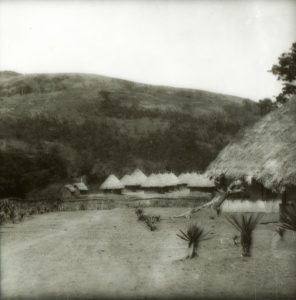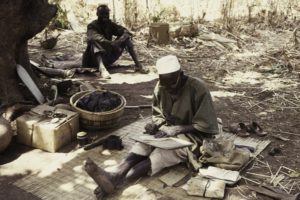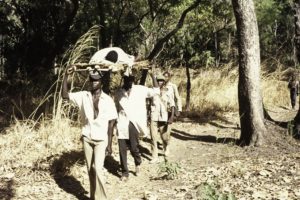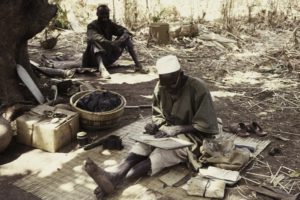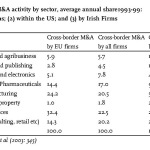Sjoerd Hofstra ~ Sierra Leone In The Years 1934-1936.
This category contains photographs made by researcher Sjoerd Hofstra (1898-1983). Most of the photographs were made in Sierra Leone in the years 1934-1936. His daughter, Marijke Gijswijt-Hofstra, has kindly agreed in making his photographs available with a CC-BY-SA license. Uploading and categorizing was done by staff members of the African Studies Centre Leiden (the Netherlands).
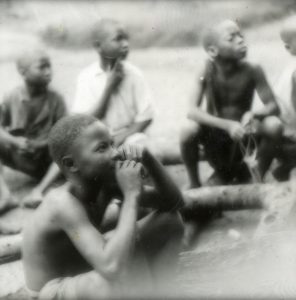
Four boys looking/listening. Sierra Leone, 1935. Collection Hofstra. Panguma (surroundings). Photograph: Sjoerd Hofstra
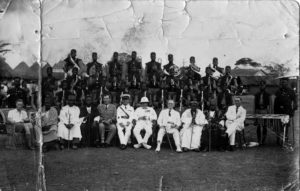
Seated company and military chapel standing behind, Kailahun May 1934. Front row from left to right: Sjoerd Hofstra, three chiefs, the assistant District Commissioner, the band master, the D.C. of Kailahun, an old English trader, two chiefs and a civil servant.
See more: https://commons.wikimedia.org/Sjoerd_Hofstra
Fenneken Veldkamp ~ Farewell Interview With Ton Dietz As Director Of The African Studies Centre Leiden
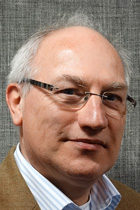 Ton Dietz, a human geographer, will retire as the director of the African Studies Centre Leiden and as a professor of African Development at Leiden University on 1 September 2017. On this occasion, we did a ‘farewell’ interview with him.
Ton Dietz, a human geographer, will retire as the director of the African Studies Centre Leiden and as a professor of African Development at Leiden University on 1 September 2017. On this occasion, we did a ‘farewell’ interview with him.
You have been the director of this Centre and a Professor of African Development at Leiden University since May 2010. What was a highlight for you during your directorship?
‘The best highlight – there were many – was the news that Chibuike Uche had been appointed as full Professor at the African Studies Centre, last April. Many things were combined in that: 1) It was the first official Professor we got as African Studies Centre. That was possible because of our successful merger with Leiden University. 2) It’s a subsidy for the next three years from the Ministry of Foreign Affairs, acknowledging the importance of what the African Studies Centre did and does for the Ministry. 3) The Chair was named after Stephen Ellis. And Stephen Ellis has been our most important, most influential scholar, who unfortunately died in 2015. And finally, it was very important to have a first African Professor as a member of our staff, and a Professor in a very important field: the Governance of Finance and Integrity in Africa. Which makes it clear that the political economy aspects of the study of Africa have become very much at the heart of the African Studies Centre, next to all the other things we are doing. The fact that Chibuike Uche has been appointed to this Chair for me is in fact a dream come true of what I see an African Studies Centre should be.’
In your inaugural address ‘Silverlining Africa’ in January 2011 you were optimistic about Africa, almost in a provocative way. You said:
‘Not long ago, the continent was seen as lagging behind, a sick place full of violence, hunger and disease, and either a threat to world stability or a disposable place to avoid. Now its image has shifted to one of hope, which is making Africa a hotspot in the new geopolitical reality of a multi-polar world.’
In the meantime, we have seen tremendous outbursts of violence, the Ebola virus epidemic and, recently again, millions of Africans threatened with starvation. Has the image, and reality, shifted to that of a sick place again?
‘As you rightly say: it was deliberate intention to provoke, because so many of the people who dealt with Africa, particularly in the media at that time, were still so much overwhelmed by this negative atmosphere, while the examples of things that did go well or were nice, were just minor experiences. I decided to try to flip the coin. In the 2000s it was already clear that Africa’s economies were experiencing high growth rates, that there clearly was a growing middle class. So it was not a story that was cooked, it was real.
Read more: http://www.ascleiden.nl/farewell-interview-ton-dietz
Marja J. Spierenburg ~ Strangers, Spirits, And Land Reforms : Conflicts About Land In Dande, Northern Zimbabwe
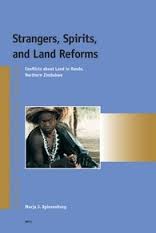 This book describes efforts by the Zimbabwean government to enforce land reforms on African farmers in northern Zimbabwe. These efforts compounded rather than alleviated the problem of land scarcity for black small-scale farmers, a problem government now allegedly seeks to redress through invasions of white-owned farms. The book describes the similarities between the post-Independence land reforms and those attempted by the Rhodesian regime.
This book describes efforts by the Zimbabwean government to enforce land reforms on African farmers in northern Zimbabwe. These efforts compounded rather than alleviated the problem of land scarcity for black small-scale farmers, a problem government now allegedly seeks to redress through invasions of white-owned farms. The book describes the similarities between the post-Independence land reforms and those attempted by the Rhodesian regime.
Afrika-Studiecentrum series, ISSN 1570-9310 ; vol. 3
Read the book (PDF): https://openaccess.leidenuniv.nl/handle/1887/18548
Roel Coutinho ~ Guinea-Bissau And Senegal 1973-1974
In 2016 professor Roel Coutinho (on Dutch wikipedia) MD donated 752 photographs and slides made by him in the course of his medical work in Guinea-Bissau and Senegal in 1973 and 1974, during the final year of the war of independence waged by the PAIGC (Partido Africano da Independência da Guiné e Cabo Verde) resistance movement against Portugal. The digital images are located in Category:Guinea-Bissau and Senegal 1973-1974 (Coutinho Collection). The physical collection is part of the Library of the African Studies Centre, Leiden (the Netherlands).
The donation includes images of daily life, dance and parties, hospitals, further medical interest, PAIGC soldiers and weapons, open air people’s shops and schools, and pictures of the later first President (Luís Cabral) and later first Prime Minister (Francisco Mendes) of Guinea-Bissau. The metadata for this collection were collected and organised including captions in Portugese by Michele Portatadino, MA African Studies, Leiden University. The photographs were digitized by GMS Digitaliseert in Alblasserdam. Harro Westra did the technological set-up. Hans Muller finalised the upload to Wikimedia Commons using the GLAMwiki Toolset. The project was initiated by Jos Damen and sponsored by the African Studies Centre, Leiden University.
The Belizean Garifuna ~ Organization Of Identity In An Ethnic Community In Central America
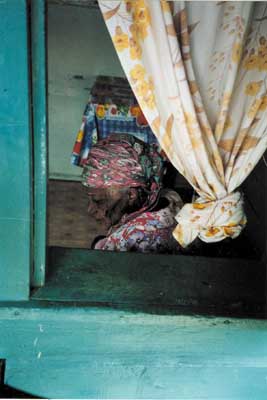 If the world had any ends, British Honduras would certainly be one of them. It is not on the way from anywhere to anywhere else’ (Aldous Huxley 1984:21).
If the world had any ends, British Honduras would certainly be one of them. It is not on the way from anywhere to anywhere else’ (Aldous Huxley 1984:21).
When I had to do fieldwork in the Caribbean region for my final research several years ago, someone from the department of cultural Anthropology in Utrecht in the Netherlands asked me why I didn’t go to Belize. My answer to his question was at that time quite significant: ‘Belize??’ I had no idea where it was and could not picture it at all.
Libraries that I visited in the Netherlands hardly provided any solace. Most of the books on Central America hardly mentioned Belize. Booth and Walker describe the position of the country as follows in ‘Understanding Central-America’: ‘Though Belize is technically Central America, that English-speaking microstate has a history that is fairly distinct from that of the other states in the region. At present this tiny republic, which only became formally independent from Great-Britain in 1981, does not figure significantly in the ‘Central American’ problem’ (1993:3).
Multi-Ethnic Belize
The fact that Belize receives little attention in literature on Central America underlines the peripheral position of the country in this region. Some authors qualify it as part of the Caribbean world; others primarily see Belize as a member of the British Commonwealth. Besides that it is also seen as part of the Central American context. The Formation of a colonial Society (1977) by the English sociologist Nigel O. Bolland was the first scientific work on Belize that I was able to acquire. The Belize Guide (1989) by Paul Glassman provided me with a tourist orientated view of this ‘wonderland of strange people and things’ (Glassman 1989:1). Collecting sustaining literature was and remains a tiresome adventure. Slowly but surely my list of literature expanded.
My knowledge of the region was limited. Reactions from others also confirmed that Belize is a country with a slight reputation. For example, I still remember being corrected by someone from a travel agency. After asking the gentleman if a direct flight to Belize existed, he answered somewhat pityingly: ‘Sir, you must mean Benin´. In my circle of friends, Belize also turned out to be unheard of. The neighboring countries Guatemala and Mexico are better known. An important reason for this is that the media informs people of the most important happenings in these countries. This information is often clarified using maps of the area on which Guatemala and Mexico, but also Belize, are marked. Nonetheless, time and time again Belize turns out to be a country that does not appeal to the imagination. Read more
Research Dossier Leiden University: ‘Africa Reconsidered’
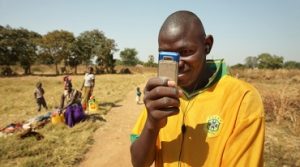 Africa is a continent in transition, with developments occurring at breakneck speed. African Studies scholars from different academic disciplines of Leiden University have conducted research for many decades. Their close links with African partners and their emphasis on fundamental research have enabled them to generate insights that benefit both African and Western societies. Leiden University created a new research dossier ‘Africa reconsidered’ on its website, for which many ASCL researchers were interviewed.
Africa is a continent in transition, with developments occurring at breakneck speed. African Studies scholars from different academic disciplines of Leiden University have conducted research for many decades. Their close links with African partners and their emphasis on fundamental research have enabled them to generate insights that benefit both African and Western societies. Leiden University created a new research dossier ‘Africa reconsidered’ on its website, for which many ASCL researchers were interviewed.
Read the new research dossier ‘Africa reconsidered‘ in English.
Lees het wetenschapsdossier ‘Afrika heroverwogen‘ in het Nederlands.
